Travel Through The Democratic Republic Of Congo on a Harley-Davidson
By Peter & Kay Forwood
Democratic Republic Of Congo on a Harley (19/11/00 -
5/12/00) 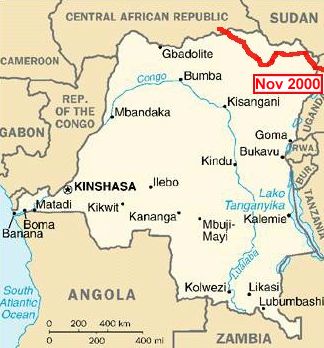
Distance 1179 km (208275 km to 209454 km)
This is part of the Seventh section of our around the
world trip.
Complete Trip Overview & Map
Coming from Uganda
19/11/00 An easy out of Uganda and a pleasant but
firm into the Democratic Republic of Congo. The country is currently at war
with itself. The southern half controlled by Kabila, the government, and
the northern part by rebel groups believed to be backed by Uganda and Rwanda.
We are travelling through the rebel held territory and are therefore unable
to obtain visas before the border (they have no embassies). The war is currently
being fought well to our south and we should not go any closer to the front
than about 300 km. The rebel held area is held by more than one group so
we asked for an eight day transit visa having been informed we would require
a new visa on entering the next rebel area. Eight day transit visas $US
30.00, 30 day visa $US 60.00. There were three attempts at obtaining extra
payments. The visas were quoted as $US 40.00 but the correct amount was written
on the wall of the office. There was a $US 10.00 fee for photography and
the same again to open the gate, it being Sunday.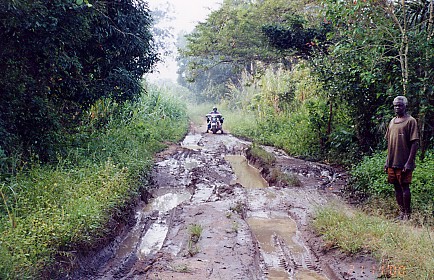 When they were unable to produce any receipt book for previous similar
payments we refused politely, calming the situation by changing money with
the customs official at very slightly below the street rate, allowing him
some profit. The whole process took two hours and was friendly and encouraging
and welcoming. Ugandan shillings and US dollars are the only acceptable currencies.
We stayed the night in Aru at the border and have to adapt to having lost
English Africa, entering French speaking territory and driving on the other
side of the road. As we haven't seen a car since our arrival it shouldn't
be too difficult. We are reportedly the ninth and tenth tourists to enter
at this border so far this year.
When they were unable to produce any receipt book for previous similar
payments we refused politely, calming the situation by changing money with
the customs official at very slightly below the street rate, allowing him
some profit. The whole process took two hours and was friendly and encouraging
and welcoming. Ugandan shillings and US dollars are the only acceptable currencies.
We stayed the night in Aru at the border and have to adapt to having lost
English Africa, entering French speaking territory and driving on the other
side of the road. As we haven't seen a car since our arrival it shouldn't
be too difficult. We are reportedly the ninth and tenth tourists to enter
at this border so far this year.
20/11/00 Petrol from a roadside drum and the beginning
of today's 113 km over six hours with rest stops. 45 km to Ariwara, and
we changed Ugandan shillings to D.R.C. Francs at the markets.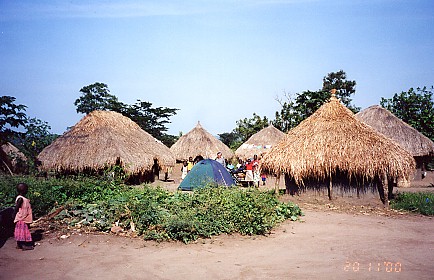 Another three km's and a decision of roads, East on the Sudan route or
the western road to Aba via Kitambala. All the bicyclists take the Kitambala
route, shorter and more suited for smaller vehicles. There is a steady stream
of hundreds of bicycles carrying petrol from Ariwara to Isiro some hundreds
of kms into Congo. They then return with palm tree cooking oils. The trip
takes seven days each way and the bicycles carry up to 80 kg's of liquids
in three or four 20 litre containers. The roads are so bad that it is cheaper
to use human power than vehicles. The rain here stopped four days ago and
it is now easier travelling although the truck carved potholes are difficult
to avoid and many are still full of mud.
Another three km's and a decision of roads, East on the Sudan route or
the western road to Aba via Kitambala. All the bicyclists take the Kitambala
route, shorter and more suited for smaller vehicles. There is a steady stream
of hundreds of bicycles carrying petrol from Ariwara to Isiro some hundreds
of kms into Congo. They then return with palm tree cooking oils. The trip
takes seven days each way and the bicycles carry up to 80 kg's of liquids
in three or four 20 litre containers. The roads are so bad that it is cheaper
to use human power than vehicles. The rain here stopped four days ago and
it is now easier travelling although the truck carved potholes are difficult
to avoid and many are still full of mud. 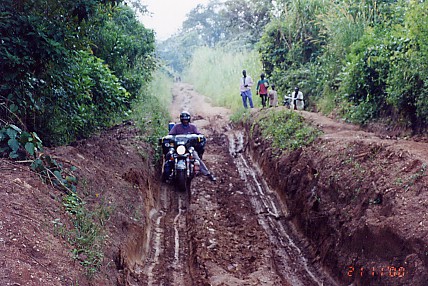 We averaged less than 25 km/hr and never got out of second gear, mostly
first. We stopped at Kitambala and were accosted by the immigration official.
A village of probably three hundred people. A $US 5.00 fee was requested.
We responded that all the immigration fees for our eight day visa were paid
when it was issued. Again a compromise where we agreed to pay small money
to camp in the village. Water for a bucket bath, food and clothes washing
was also provided while we enjoyed celebrity status.
We averaged less than 25 km/hr and never got out of second gear, mostly
first. We stopped at Kitambala and were accosted by the immigration official.
A village of probably three hundred people. A $US 5.00 fee was requested.
We responded that all the immigration fees for our eight day visa were paid
when it was issued. Again a compromise where we agreed to pay small money
to camp in the village. Water for a bucket bath, food and clothes washing
was also provided while we enjoyed celebrity status.
21/11/00 Headed into the worst road we have seen and the
worst I can imagine and still allow vehicles to move. 2 metre deep gutters
cut by large trucks moving in the wet, grass lining the roadside three metres
high and almost covering it in parts. We had to choose between muddy truck
ruts and bumpy bicycle ridges.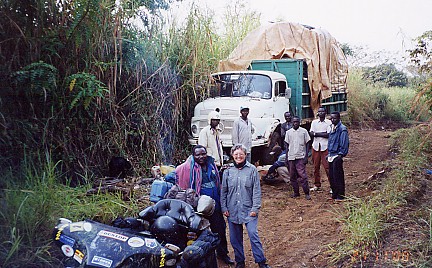 We rode the ridges at first until the bike bottomed, my legs weren't long
enough and we dropped the motorcycle into the ditch smashing its mirror.
Then we rode the muddy gutters but the thick clay filled the sprockets stretching
the belt drive and on leaving one mud hole the belt snapped, leaving the bike
stranded. With little encouragement the locals, using their hoes, chipped
a path for the motorcycle and pushed us up to dry ground. They then cut down
a tree into short lengths and we lifted the rear end off the ground to replace
the belt. A bowl of water to wash away most of the mud before working was
also provided. This is an area where we have not seen a western product other
than cooking pots and plastic water containers used by the locals. An area
where there have been few westerners to spoil the generosity of the people.
We worked for six hours to fit our spare belt, paid the locals less than $US
2.00 for their assistance and completed another 12 km before night making
a total of 25 km for the day. We pay money always in local currency as it
appears more relevant to them and it is difficult for them to calculate the
exchange rate or to change dollars.
We rode the ridges at first until the bike bottomed, my legs weren't long
enough and we dropped the motorcycle into the ditch smashing its mirror.
Then we rode the muddy gutters but the thick clay filled the sprockets stretching
the belt drive and on leaving one mud hole the belt snapped, leaving the bike
stranded. With little encouragement the locals, using their hoes, chipped
a path for the motorcycle and pushed us up to dry ground. They then cut down
a tree into short lengths and we lifted the rear end off the ground to replace
the belt. A bowl of water to wash away most of the mud before working was
also provided. This is an area where we have not seen a western product other
than cooking pots and plastic water containers used by the locals. An area
where there have been few westerners to spoil the generosity of the people.
We worked for six hours to fit our spare belt, paid the locals less than $US
2.00 for their assistance and completed another 12 km before night making
a total of 25 km for the day. We pay money always in local currency as it
appears more relevant to them and it is difficult for them to calculate the
exchange rate or to change dollars.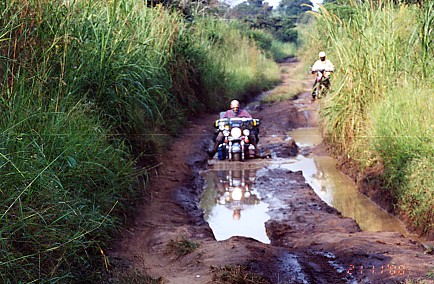 Tonight's village very basic, our bath, a secluded spot on the creek, surrounded
by tall grass where we both fully stripped to wash the mud off in the mountain
cold waters. Their toilet, a pit covered in sticks and dirt with a small
hole, again using only the tall grasses as walls. Absolutely stuffed we were
in bed by dark.
Tonight's village very basic, our bath, a secluded spot on the creek, surrounded
by tall grass where we both fully stripped to wash the mud off in the mountain
cold waters. Their toilet, a pit covered in sticks and dirt with a small
hole, again using only the tall grasses as walls. Absolutely stuffed we were
in bed by dark.
22/11/00 A better day, after the first 6 km the road levelled
off and the previous undulating countryside disappeared. The 35 km to Aba
in about two hours only passing two trucks totally bogged in a mud hole.
This old Belgian town with mango tree lined streets and dilapidated old mansions
their windows and doors gone and roofs rusting is now little more than a village.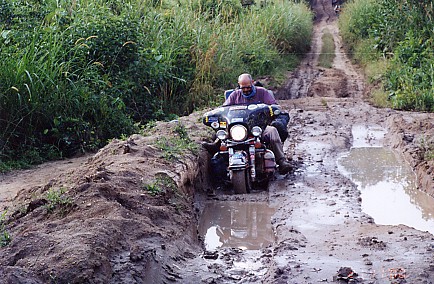 We were now crossing log bridges, about ten today, the top two layers of
wood worn off years ago leaving only the supporting logs. Some of the logs
are worn flat while others more round making crossing hazardous. The next
66 km to Faradje along a long ago built road of volcanic rock, properly
formed and edged but now the top layer of soil gone. There were gangs of
people resurfacing with soil some sections around their villages and asking,
often forcefully, for contributions to their work. About ten cents seems
quite adequate. It's difficult to get a feel of how much to pay that is generous,
but not that generous as to spoil the locals for other travellers.
We were now crossing log bridges, about ten today, the top two layers of
wood worn off years ago leaving only the supporting logs. Some of the logs
are worn flat while others more round making crossing hazardous. The next
66 km to Faradje along a long ago built road of volcanic rock, properly
formed and edged but now the top layer of soil gone. There were gangs of
people resurfacing with soil some sections around their villages and asking,
often forcefully, for contributions to their work. About ten cents seems
quite adequate. It's difficult to get a feel of how much to pay that is generous,
but not that generous as to spoil the locals for other travellers.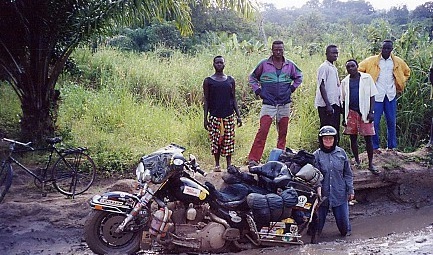 We still managed to have the tools out twice, once to straighten the stand
spring and again after we knocked off the right hand muffler on a rock.
The road still good we pressed on for another 40 km towards Dungu to camp
roadside at a bicycle stop. We had lost the bicycle path at Kitambala, them
taking the longer but easier route to Faradje avoiding the hilly mud we encountered
yesterday. It's great to be back with them again as their tracks make a defined
path between potholes and identify the easiest routes over rocky sections.
They also encourage roadside commerce with oranges, bananas and maize available.
Our main meals have consisted of cassava bread and chicken or fish.
We still managed to have the tools out twice, once to straighten the stand
spring and again after we knocked off the right hand muffler on a rock.
The road still good we pressed on for another 40 km towards Dungu to camp
roadside at a bicycle stop. We had lost the bicycle path at Kitambala, them
taking the longer but easier route to Faradje avoiding the hilly mud we encountered
yesterday. It's great to be back with them again as their tracks make a defined
path between potholes and identify the easiest routes over rocky sections.
They also encourage roadside commerce with oranges, bananas and maize available.
Our main meals have consisted of cassava bread and chicken or fish.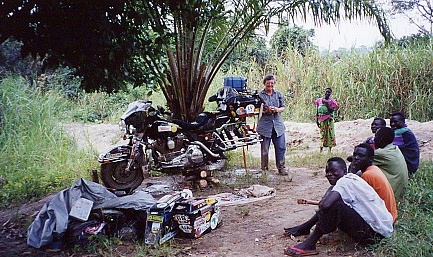 The root vegetable is dried then crushed to a fine powder in a mortar and
pestle then boiled to a clear sticky mass. Not a pleasant taste but mixed
with a sauce quite edible. We did not see another vehicle moving all day
other than two small motorcycles, and without them there would be no need
for petrol in this area, available only from 20 litre plastic containers.
The root vegetable is dried then crushed to a fine powder in a mortar and
pestle then boiled to a clear sticky mass. Not a pleasant taste but mixed
with a sauce quite edible. We did not see another vehicle moving all day
other than two small motorcycles, and without them there would be no need
for petrol in this area, available only from 20 litre plastic containers.
23/11/00 We awoke to not a mechanical noise, despite being
camped next to quite a large village, just the sounds of roosters, goats
and happy people laughing and joking. The road today not so good. It had
rained in the area overnight, violent thunderstorms but not a lot of rain.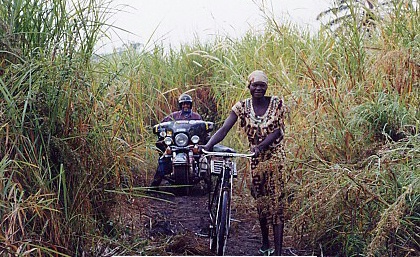 The road wet and the pot holes fuller meant constant weaving and dodging
making my already tired arms feel like I had been working out at Arnold
Schwarzenegger's gym. Passing through dense rain forest where the sun often
never reaches the ground to dry it didn't help. At one stage it was necessary
to take a bicycle wide track through forest and crops around an extended
bog hole. The track often running close to trees, some cut to stumps in the
grass, one we hit hard bending the crash bars back to almost the foot boards.
We had nothing to straighten them so turned the motorcycle around and crashed
into the same stump with the other side bending the bars straight.
The road wet and the pot holes fuller meant constant weaving and dodging
making my already tired arms feel like I had been working out at Arnold
Schwarzenegger's gym. Passing through dense rain forest where the sun often
never reaches the ground to dry it didn't help. At one stage it was necessary
to take a bicycle wide track through forest and crops around an extended
bog hole. The track often running close to trees, some cut to stumps in the
grass, one we hit hard bending the crash bars back to almost the foot boards.
We had nothing to straighten them so turned the motorcycle around and crashed
into the same stump with the other side bending the bars straight.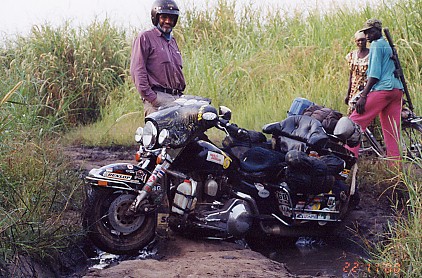 We arrived at Dungu, 105 km today, at 3 pm having seen only a bogged truck
and were allowed to stay at the mission. Run down from lack of supplies
or money there are no spare beds or furniture but we were offered an almost
empty room with toilet and plumbing not having worked for years. While in
the markets we were again accosted by an immigration official. This time
more firmly, and were escorted to the boss's house where an elaborate hoax
of "no visa in the passport, where is the photography permit and do you have
a permit to buy things". A firm hour spent denying any need for these things
allowed our reprieve from the situation. If people keep paying officials
bribes for nothing they will keep accosting more tourists and create hassles
like today.
We arrived at Dungu, 105 km today, at 3 pm having seen only a bogged truck
and were allowed to stay at the mission. Run down from lack of supplies
or money there are no spare beds or furniture but we were offered an almost
empty room with toilet and plumbing not having worked for years. While in
the markets we were again accosted by an immigration official. This time
more firmly, and were escorted to the boss's house where an elaborate hoax
of "no visa in the passport, where is the photography permit and do you have
a permit to buy things". A firm hour spent denying any need for these things
allowed our reprieve from the situation. If people keep paying officials
bribes for nothing they will keep accosting more tourists and create hassles
like today.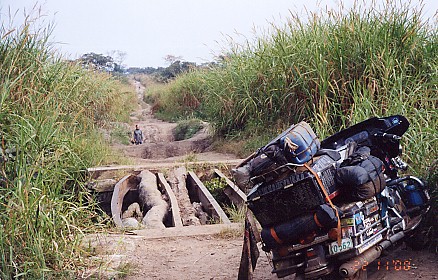 We advised them that the border officials (they didn't) warned us against
scams, not to pay bribes and report any requests to border immigration as
they are trying to stamp out corruption. When asked for money at the end,
just to help, we pointed out we support charities that the money goes to needy
children living in grass huts in villages. These officials were living in
the best houses in town. We have the same problem with cigarettes. Everyone
asks for cigarettes, who started giving them away to create this deluge of
requests along the way.
We advised them that the border officials (they didn't) warned us against
scams, not to pay bribes and report any requests to border immigration as
they are trying to stamp out corruption. When asked for money at the end,
just to help, we pointed out we support charities that the money goes to needy
children living in grass huts in villages. These officials were living in
the best houses in town. We have the same problem with cigarettes. Everyone
asks for cigarettes, who started giving them away to create this deluge of
requests along the way.
24/11/00 The costs here are minimal. Papaya, 10c, orange
1c, lunch of meat and rice, 33c, etc. We pay by means of contribution about
one dollar for camping, water and use of toilet. Even petrol at $US 1.30
a litre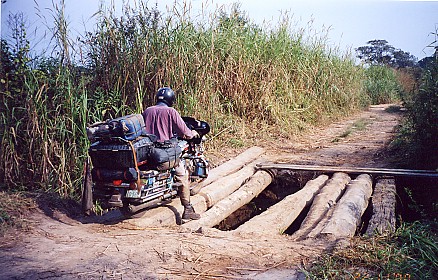 isn't an enormous expense as we can only travel about 100 km per day, even
though the motorcycle only gets about 12 km per litre in first gear through
this terrain. We awoke at the mission to morning drums calling the faithful
to prayer/mass. Appreciating the relative comfort here we decided to rest
a day and wash muddy clothes and let wet boots dry. The congregation is
sparked along by a lively choir and musical instruments and we wonder which
society has the greater lifestyle wealth. We are also surprised how many
people speak english. Some only a little, many wanting to practice and others
too shy to speak it but obviously listening to our conversations. It is difficult
to come to grips with the currency here. There are "Franc" notes which are
100,000 new Zaires. Goodness knows what old Zaires are worth as 100,000 new
Zaires is 1.5 cents.
isn't an enormous expense as we can only travel about 100 km per day, even
though the motorcycle only gets about 12 km per litre in first gear through
this terrain. We awoke at the mission to morning drums calling the faithful
to prayer/mass. Appreciating the relative comfort here we decided to rest
a day and wash muddy clothes and let wet boots dry. The congregation is
sparked along by a lively choir and musical instruments and we wonder which
society has the greater lifestyle wealth. We are also surprised how many
people speak english. Some only a little, many wanting to practice and others
too shy to speak it but obviously listening to our conversations. It is difficult
to come to grips with the currency here. There are "Franc" notes which are
100,000 new Zaires. Goodness knows what old Zaires are worth as 100,000 new
Zaires is 1.5 cents.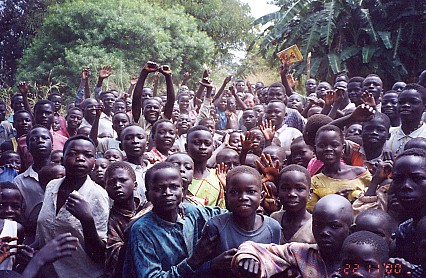 We enjoyed tea, lunch and buying supplies in the markets while having a
pleasant conversation with a Ugandan man who had tried to reach Egypt through
Sudan when war broke out there, he moved to Congo where he has now seen two
waves of rebels come and loot this town. We were invited to and enjoyed dinner
with our mission hosts in the evening.
We enjoyed tea, lunch and buying supplies in the markets while having a
pleasant conversation with a Ugandan man who had tried to reach Egypt through
Sudan when war broke out there, he moved to Congo where he has now seen two
waves of rebels come and loot this town. We were invited to and enjoyed dinner
with our mission hosts in the evening.
25/11/00 Photos and farewells and advice to travel the
Gao road and not the main road to Rungu as the main road has been destroyed
by trucks. 58 km towards Gao on a reasonably good road before a bush track
again through dense forest and with many palm oil palms shading the road.
Five log bridges and four streams to cross and with heavy violent thunderstorms
last night the road was still muddy and slippery. We have stopped counting
how many times Kay has to walk, and how many times we drop the motorcycle.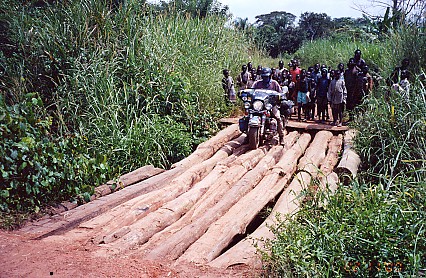 Once we ran off the road with the road tyres just sliding sideways on mud,
wet leaves and sticks and a worse incident when the motorcycle flicked sideways
into a large hole catapulting Kay and I as it leapt out again. There appears
to be no damage to the motorcycle other than bent crash bars again and dents
in the front fork sliders where the bars hit them and a dent across the front
mudguard. We reached the main road again about 20 km north of Rungu and with
the afternoon sun drying the road we managed to complete 150 km before camping
in a village for the night with another storm wetting the ground for tomorrow's
ride.
Once we ran off the road with the road tyres just sliding sideways on mud,
wet leaves and sticks and a worse incident when the motorcycle flicked sideways
into a large hole catapulting Kay and I as it leapt out again. There appears
to be no damage to the motorcycle other than bent crash bars again and dents
in the front fork sliders where the bars hit them and a dent across the front
mudguard. We reached the main road again about 20 km north of Rungu and with
the afternoon sun drying the road we managed to complete 150 km before camping
in a village for the night with another storm wetting the ground for tomorrow's
ride.
26/11/00 Misty rain in the morning keeping the road slippery.
With afternoon storms on the last three evenings the road is only dry in
sunny areas for a couple of hours each day and remains wet permanently in
the bamboo and rain forest areas.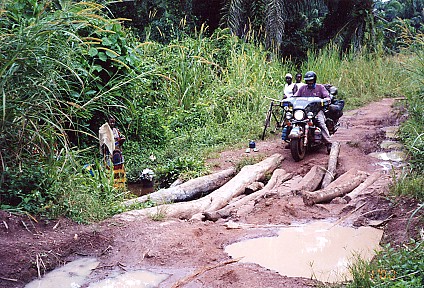 The 50 km to Isiro OK but again the immigration officials had us before
we could buy enough petrol and leave. We were firmer here, showing documents
in the street and resisting any move to be taken to their offices. They
were annoyed, we were concerned, but left town without problems. We actually
reached third gear a couple of times in the first 30 km towards Poko then
slippery red soil and up and down gullies slowed the pace for the next 35
km's. Finally camped roadside about 100 km from Isiro. Petrol the same price
but the quality deteriorating. Probably kerosene mix. Bike pinging and pre
igniting. We have developed a travel routine of one hour riding and 15 minutes
rest to keep us from carrying on when tired and making mistakes like yesterday.
The last two days there have been no vehicles on the road other than a bogged
truck and two motorcycles.
The 50 km to Isiro OK but again the immigration officials had us before
we could buy enough petrol and leave. We were firmer here, showing documents
in the street and resisting any move to be taken to their offices. They
were annoyed, we were concerned, but left town without problems. We actually
reached third gear a couple of times in the first 30 km towards Poko then
slippery red soil and up and down gullies slowed the pace for the next 35
km's. Finally camped roadside about 100 km from Isiro. Petrol the same price
but the quality deteriorating. Probably kerosene mix. Bike pinging and pre
igniting. We have developed a travel routine of one hour riding and 15 minutes
rest to keep us from carrying on when tired and making mistakes like yesterday.
The last two days there have been no vehicles on the road other than a bogged
truck and two motorcycles.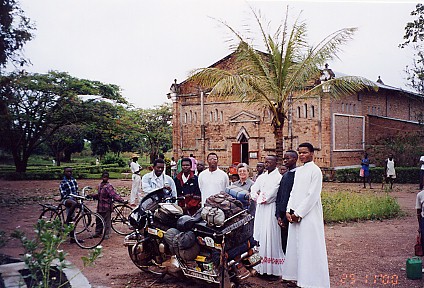 One on his way to Isiro to trade diamonds, before returning to Amadi. We
are starting to see dead monkeys carried by hunters. The people untouched
by western goods that they are surprised by our cigarette lighter. The magic
of the tent poles being straightened and folded and intrigue over tea bags.
They know what a camera is and love to pose for photos whenever we try to
take some. There seems to be no concern for our safety from any of the villagers,
they seem honest, with cigarettes sold singly, money and cigarettes left for
people to help themselves. The same applies to some small edible items.
One on his way to Isiro to trade diamonds, before returning to Amadi. We
are starting to see dead monkeys carried by hunters. The people untouched
by western goods that they are surprised by our cigarette lighter. The magic
of the tent poles being straightened and folded and intrigue over tea bags.
They know what a camera is and love to pose for photos whenever we try to
take some. There seems to be no concern for our safety from any of the villagers,
they seem honest, with cigarettes sold singly, money and cigarettes left for
people to help themselves. The same applies to some small edible items.
Move with us to the second section of The Democratic Republic of Congo
 When they were unable to produce any receipt book for previous similar
payments we refused politely, calming the situation by changing money with
the customs official at very slightly below the street rate, allowing him
some profit. The whole process took two hours and was friendly and encouraging
and welcoming. Ugandan shillings and US dollars are the only acceptable currencies.
We stayed the night in Aru at the border and have to adapt to having lost
English Africa, entering French speaking territory and driving on the other
side of the road. As we haven't seen a car since our arrival it shouldn't
be too difficult. We are reportedly the ninth and tenth tourists to enter
at this border so far this year.
When they were unable to produce any receipt book for previous similar
payments we refused politely, calming the situation by changing money with
the customs official at very slightly below the street rate, allowing him
some profit. The whole process took two hours and was friendly and encouraging
and welcoming. Ugandan shillings and US dollars are the only acceptable currencies.
We stayed the night in Aru at the border and have to adapt to having lost
English Africa, entering French speaking territory and driving on the other
side of the road. As we haven't seen a car since our arrival it shouldn't
be too difficult. We are reportedly the ninth and tenth tourists to enter
at this border so far this year. 
 Another three km's and a decision of roads, East on the Sudan route or
the western road to Aba via Kitambala. All the bicyclists take the Kitambala
route, shorter and more suited for smaller vehicles. There is a steady stream
of hundreds of bicycles carrying petrol from Ariwara to Isiro some hundreds
of kms into Congo. They then return with palm tree cooking oils. The trip
takes seven days each way and the bicycles carry up to 80 kg's of liquids
in three or four 20 litre containers. The roads are so bad that it is cheaper
to use human power than vehicles. The rain here stopped four days ago and
it is now easier travelling although the truck carved potholes are difficult
to avoid and many are still full of mud.
Another three km's and a decision of roads, East on the Sudan route or
the western road to Aba via Kitambala. All the bicyclists take the Kitambala
route, shorter and more suited for smaller vehicles. There is a steady stream
of hundreds of bicycles carrying petrol from Ariwara to Isiro some hundreds
of kms into Congo. They then return with palm tree cooking oils. The trip
takes seven days each way and the bicycles carry up to 80 kg's of liquids
in three or four 20 litre containers. The roads are so bad that it is cheaper
to use human power than vehicles. The rain here stopped four days ago and
it is now easier travelling although the truck carved potholes are difficult
to avoid and many are still full of mud.  We averaged less than 25 km/hr and never got out of second gear, mostly
first. We stopped at Kitambala and were accosted by the immigration official.
A village of probably three hundred people. A $US 5.00 fee was requested.
We responded that all the immigration fees for our eight day visa were paid
when it was issued. Again a compromise where we agreed to pay small money
to camp in the village. Water for a bucket bath, food and clothes washing
was also provided while we enjoyed celebrity status.
We averaged less than 25 km/hr and never got out of second gear, mostly
first. We stopped at Kitambala and were accosted by the immigration official.
A village of probably three hundred people. A $US 5.00 fee was requested.
We responded that all the immigration fees for our eight day visa were paid
when it was issued. Again a compromise where we agreed to pay small money
to camp in the village. Water for a bucket bath, food and clothes washing
was also provided while we enjoyed celebrity status.  We rode the ridges at first until the bike bottomed, my legs weren't long
enough and we dropped the motorcycle into the ditch smashing its mirror.
Then we rode the muddy gutters but the thick clay filled the sprockets stretching
the belt drive and on leaving one mud hole the belt snapped, leaving the bike
stranded. With little encouragement the locals, using their hoes, chipped
a path for the motorcycle and pushed us up to dry ground. They then cut down
a tree into short lengths and we lifted the rear end off the ground to replace
the belt. A bowl of water to wash away most of the mud before working was
also provided. This is an area where we have not seen a western product other
than cooking pots and plastic water containers used by the locals. An area
where there have been few westerners to spoil the generosity of the people.
We worked for six hours to fit our spare belt, paid the locals less than $US
2.00 for their assistance and completed another 12 km before night making
a total of 25 km for the day. We pay money always in local currency as it
appears more relevant to them and it is difficult for them to calculate the
exchange rate or to change dollars.
We rode the ridges at first until the bike bottomed, my legs weren't long
enough and we dropped the motorcycle into the ditch smashing its mirror.
Then we rode the muddy gutters but the thick clay filled the sprockets stretching
the belt drive and on leaving one mud hole the belt snapped, leaving the bike
stranded. With little encouragement the locals, using their hoes, chipped
a path for the motorcycle and pushed us up to dry ground. They then cut down
a tree into short lengths and we lifted the rear end off the ground to replace
the belt. A bowl of water to wash away most of the mud before working was
also provided. This is an area where we have not seen a western product other
than cooking pots and plastic water containers used by the locals. An area
where there have been few westerners to spoil the generosity of the people.
We worked for six hours to fit our spare belt, paid the locals less than $US
2.00 for their assistance and completed another 12 km before night making
a total of 25 km for the day. We pay money always in local currency as it
appears more relevant to them and it is difficult for them to calculate the
exchange rate or to change dollars. Tonight's village very basic, our bath, a secluded spot on the creek, surrounded
by tall grass where we both fully stripped to wash the mud off in the mountain
cold waters. Their toilet, a pit covered in sticks and dirt with a small
hole, again using only the tall grasses as walls. Absolutely stuffed we were
in bed by dark.
Tonight's village very basic, our bath, a secluded spot on the creek, surrounded
by tall grass where we both fully stripped to wash the mud off in the mountain
cold waters. Their toilet, a pit covered in sticks and dirt with a small
hole, again using only the tall grasses as walls. Absolutely stuffed we were
in bed by dark.  We were now crossing log bridges, about ten today, the top two layers of
wood worn off years ago leaving only the supporting logs. Some of the logs
are worn flat while others more round making crossing hazardous. The next
66 km to Faradje along a long ago built road of volcanic rock, properly
formed and edged but now the top layer of soil gone. There were gangs of
people resurfacing with soil some sections around their villages and asking,
often forcefully, for contributions to their work. About ten cents seems
quite adequate. It's difficult to get a feel of how much to pay that is generous,
but not that generous as to spoil the locals for other travellers.
We were now crossing log bridges, about ten today, the top two layers of
wood worn off years ago leaving only the supporting logs. Some of the logs
are worn flat while others more round making crossing hazardous. The next
66 km to Faradje along a long ago built road of volcanic rock, properly
formed and edged but now the top layer of soil gone. There were gangs of
people resurfacing with soil some sections around their villages and asking,
often forcefully, for contributions to their work. About ten cents seems
quite adequate. It's difficult to get a feel of how much to pay that is generous,
but not that generous as to spoil the locals for other travellers. We still managed to have the tools out twice, once to straighten the stand
spring and again after we knocked off the right hand muffler on a rock.
The road still good we pressed on for another 40 km towards Dungu to camp
roadside at a bicycle stop. We had lost the bicycle path at Kitambala, them
taking the longer but easier route to Faradje avoiding the hilly mud we encountered
yesterday. It's great to be back with them again as their tracks make a defined
path between potholes and identify the easiest routes over rocky sections.
They also encourage roadside commerce with oranges, bananas and maize available.
Our main meals have consisted of cassava bread and chicken or fish.
We still managed to have the tools out twice, once to straighten the stand
spring and again after we knocked off the right hand muffler on a rock.
The road still good we pressed on for another 40 km towards Dungu to camp
roadside at a bicycle stop. We had lost the bicycle path at Kitambala, them
taking the longer but easier route to Faradje avoiding the hilly mud we encountered
yesterday. It's great to be back with them again as their tracks make a defined
path between potholes and identify the easiest routes over rocky sections.
They also encourage roadside commerce with oranges, bananas and maize available.
Our main meals have consisted of cassava bread and chicken or fish. The root vegetable is dried then crushed to a fine powder in a mortar and
pestle then boiled to a clear sticky mass. Not a pleasant taste but mixed
with a sauce quite edible. We did not see another vehicle moving all day
other than two small motorcycles, and without them there would be no need
for petrol in this area, available only from 20 litre plastic containers.
The root vegetable is dried then crushed to a fine powder in a mortar and
pestle then boiled to a clear sticky mass. Not a pleasant taste but mixed
with a sauce quite edible. We did not see another vehicle moving all day
other than two small motorcycles, and without them there would be no need
for petrol in this area, available only from 20 litre plastic containers.
 The road wet and the pot holes fuller meant constant weaving and dodging
making my already tired arms feel like I had been working out at Arnold
Schwarzenegger's gym. Passing through dense rain forest where the sun often
never reaches the ground to dry it didn't help. At one stage it was necessary
to take a bicycle wide track through forest and crops around an extended
bog hole. The track often running close to trees, some cut to stumps in the
grass, one we hit hard bending the crash bars back to almost the foot boards.
We had nothing to straighten them so turned the motorcycle around and crashed
into the same stump with the other side bending the bars straight.
The road wet and the pot holes fuller meant constant weaving and dodging
making my already tired arms feel like I had been working out at Arnold
Schwarzenegger's gym. Passing through dense rain forest where the sun often
never reaches the ground to dry it didn't help. At one stage it was necessary
to take a bicycle wide track through forest and crops around an extended
bog hole. The track often running close to trees, some cut to stumps in the
grass, one we hit hard bending the crash bars back to almost the foot boards.
We had nothing to straighten them so turned the motorcycle around and crashed
into the same stump with the other side bending the bars straight. We arrived at Dungu, 105 km today, at 3 pm having seen only a bogged truck
and were allowed to stay at the mission. Run down from lack of supplies
or money there are no spare beds or furniture but we were offered an almost
empty room with toilet and plumbing not having worked for years. While in
the markets we were again accosted by an immigration official. This time
more firmly, and were escorted to the boss's house where an elaborate hoax
of "no visa in the passport, where is the photography permit and do you have
a permit to buy things". A firm hour spent denying any need for these things
allowed our reprieve from the situation. If people keep paying officials
bribes for nothing they will keep accosting more tourists and create hassles
like today.
We arrived at Dungu, 105 km today, at 3 pm having seen only a bogged truck
and were allowed to stay at the mission. Run down from lack of supplies
or money there are no spare beds or furniture but we were offered an almost
empty room with toilet and plumbing not having worked for years. While in
the markets we were again accosted by an immigration official. This time
more firmly, and were escorted to the boss's house where an elaborate hoax
of "no visa in the passport, where is the photography permit and do you have
a permit to buy things". A firm hour spent denying any need for these things
allowed our reprieve from the situation. If people keep paying officials
bribes for nothing they will keep accosting more tourists and create hassles
like today. We advised them that the border officials (they didn't) warned us against
scams, not to pay bribes and report any requests to border immigration as
they are trying to stamp out corruption. When asked for money at the end,
just to help, we pointed out we support charities that the money goes to needy
children living in grass huts in villages. These officials were living in
the best houses in town. We have the same problem with cigarettes. Everyone
asks for cigarettes, who started giving them away to create this deluge of
requests along the way.
We advised them that the border officials (they didn't) warned us against
scams, not to pay bribes and report any requests to border immigration as
they are trying to stamp out corruption. When asked for money at the end,
just to help, we pointed out we support charities that the money goes to needy
children living in grass huts in villages. These officials were living in
the best houses in town. We have the same problem with cigarettes. Everyone
asks for cigarettes, who started giving them away to create this deluge of
requests along the way.  isn't an enormous expense as we can only travel about 100 km per day, even
though the motorcycle only gets about 12 km per litre in first gear through
this terrain. We awoke at the mission to morning drums calling the faithful
to prayer/mass. Appreciating the relative comfort here we decided to rest
a day and wash muddy clothes and let wet boots dry. The congregation is
sparked along by a lively choir and musical instruments and we wonder which
society has the greater lifestyle wealth. We are also surprised how many
people speak english. Some only a little, many wanting to practice and others
too shy to speak it but obviously listening to our conversations. It is difficult
to come to grips with the currency here. There are "Franc" notes which are
100,000 new Zaires. Goodness knows what old Zaires are worth as 100,000 new
Zaires is 1.5 cents.
isn't an enormous expense as we can only travel about 100 km per day, even
though the motorcycle only gets about 12 km per litre in first gear through
this terrain. We awoke at the mission to morning drums calling the faithful
to prayer/mass. Appreciating the relative comfort here we decided to rest
a day and wash muddy clothes and let wet boots dry. The congregation is
sparked along by a lively choir and musical instruments and we wonder which
society has the greater lifestyle wealth. We are also surprised how many
people speak english. Some only a little, many wanting to practice and others
too shy to speak it but obviously listening to our conversations. It is difficult
to come to grips with the currency here. There are "Franc" notes which are
100,000 new Zaires. Goodness knows what old Zaires are worth as 100,000 new
Zaires is 1.5 cents. We enjoyed tea, lunch and buying supplies in the markets while having a
pleasant conversation with a Ugandan man who had tried to reach Egypt through
Sudan when war broke out there, he moved to Congo where he has now seen two
waves of rebels come and loot this town. We were invited to and enjoyed dinner
with our mission hosts in the evening.
We enjoyed tea, lunch and buying supplies in the markets while having a
pleasant conversation with a Ugandan man who had tried to reach Egypt through
Sudan when war broke out there, he moved to Congo where he has now seen two
waves of rebels come and loot this town. We were invited to and enjoyed dinner
with our mission hosts in the evening.  Once we ran off the road with the road tyres just sliding sideways on mud,
wet leaves and sticks and a worse incident when the motorcycle flicked sideways
into a large hole catapulting Kay and I as it leapt out again. There appears
to be no damage to the motorcycle other than bent crash bars again and dents
in the front fork sliders where the bars hit them and a dent across the front
mudguard. We reached the main road again about 20 km north of Rungu and with
the afternoon sun drying the road we managed to complete 150 km before camping
in a village for the night with another storm wetting the ground for tomorrow's
ride.
Once we ran off the road with the road tyres just sliding sideways on mud,
wet leaves and sticks and a worse incident when the motorcycle flicked sideways
into a large hole catapulting Kay and I as it leapt out again. There appears
to be no damage to the motorcycle other than bent crash bars again and dents
in the front fork sliders where the bars hit them and a dent across the front
mudguard. We reached the main road again about 20 km north of Rungu and with
the afternoon sun drying the road we managed to complete 150 km before camping
in a village for the night with another storm wetting the ground for tomorrow's
ride.  The 50 km to Isiro OK but again the immigration officials had us before
we could buy enough petrol and leave. We were firmer here, showing documents
in the street and resisting any move to be taken to their offices. They
were annoyed, we were concerned, but left town without problems. We actually
reached third gear a couple of times in the first 30 km towards Poko then
slippery red soil and up and down gullies slowed the pace for the next 35
km's. Finally camped roadside about 100 km from Isiro. Petrol the same price
but the quality deteriorating. Probably kerosene mix. Bike pinging and pre
igniting. We have developed a travel routine of one hour riding and 15 minutes
rest to keep us from carrying on when tired and making mistakes like yesterday.
The last two days there have been no vehicles on the road other than a bogged
truck and two motorcycles.
The 50 km to Isiro OK but again the immigration officials had us before
we could buy enough petrol and leave. We were firmer here, showing documents
in the street and resisting any move to be taken to their offices. They
were annoyed, we were concerned, but left town without problems. We actually
reached third gear a couple of times in the first 30 km towards Poko then
slippery red soil and up and down gullies slowed the pace for the next 35
km's. Finally camped roadside about 100 km from Isiro. Petrol the same price
but the quality deteriorating. Probably kerosene mix. Bike pinging and pre
igniting. We have developed a travel routine of one hour riding and 15 minutes
rest to keep us from carrying on when tired and making mistakes like yesterday.
The last two days there have been no vehicles on the road other than a bogged
truck and two motorcycles. One on his way to Isiro to trade diamonds, before returning to Amadi. We
are starting to see dead monkeys carried by hunters. The people untouched
by western goods that they are surprised by our cigarette lighter. The magic
of the tent poles being straightened and folded and intrigue over tea bags.
They know what a camera is and love to pose for photos whenever we try to
take some. There seems to be no concern for our safety from any of the villagers,
they seem honest, with cigarettes sold singly, money and cigarettes left for
people to help themselves. The same applies to some small edible items.
One on his way to Isiro to trade diamonds, before returning to Amadi. We
are starting to see dead monkeys carried by hunters. The people untouched
by western goods that they are surprised by our cigarette lighter. The magic
of the tent poles being straightened and folded and intrigue over tea bags.
They know what a camera is and love to pose for photos whenever we try to
take some. There seems to be no concern for our safety from any of the villagers,
they seem honest, with cigarettes sold singly, money and cigarettes left for
people to help themselves. The same applies to some small edible items.